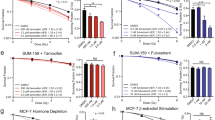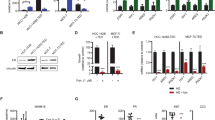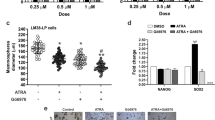Abstract
Neoplastic events are marked by uncontrolled cell proliferation. One major focus of cancer research has been to identify treatments that reduce or inhibit cell growth. Over the years, various compounds, both naturally occurring and chemically synthesized, have been used to inhibit neoplastic cell proliferation. Two such oncostatic agents, melatonin and retinoic acid, have been shown to suppress the growth of hormone-responsive breast cancer. Currently, separate clinical protocols exist for the administration of retinoids and melatonin as adjuvant therapies for cancer. Using the oestrogen receptor (ER)-positive MCF-7 human breast tumour cell line, our laboratory has studied the effects of a sequential treatment regimen of melatonin followed by all-trans retinoic acid (atRA) on breast tumour cell proliferation in vitro. Incubation of hormonally responsive MCF-7 and T47D cells with melatonin (10(-9) M) followed 24 h later by atRA (10(-9) M) resulted in the complete cessation of cell growth as well as a reduction in the number of cells to below the initial plating density. This cytocidal effect is in contrast to the growth-suppressive effects seen with either hormone alone. This regimen of melatonin followed by atRA induced cytocidal effects on MCF-7 cells by activating pathways leading to apoptosis (programmed cell death) as evidenced by decreased ER and Bcl-2 and increased Bax and transforming growth factor beta 1 (TGF-beta1) expression. Apoptosis was reflected morphologically by an increase in the number of lysosomal bodies and perinuclear chromatin condensation, cytoplasmic blebbing and the presence of apoptotic bodies. The apoptotic effect of this sequential treatment with melatonin and atRA appears to be both cell and regimen specific as (a) ER-negative MDA-MB-231 and BT-20 breast tumour cells were unaffected, and (b) the simultaneous administration of melatonin and atRA was not associated with apoptosis in any of the breast cancer cell lines studied. Taken together, the results suggest that use of an appropriate regimen of melatonin and atRA should be considered for preclinical and clinical evaluation against ER-positive human breast cancer.
This is a preview of subscription content, access via your institution
Access options
Subscribe to this journal
Receive 24 print issues and online access
$259.00 per year
only $10.79 per issue
Buy this article
- Purchase on Springer Link
- Instant access to full article PDF
Prices may be subject to local taxes which are calculated during checkout
Similar content being viewed by others
Author information
Authors and Affiliations
Rights and permissions
About this article
Cite this article
Eck, K., Yuan, L., Duffy, L. et al. A sequential treatment regimen with melatonin and all-trans retinoic acid induces apoptosis in MCF-7 tumour cells. Br J Cancer 77, 2129–2137 (1998). https://doi.org/10.1038/bjc.1998.357
Issue Date:
DOI: https://doi.org/10.1038/bjc.1998.357
This article is cited by
-
Evaluation of melatonin and AFMK levels in women with breast cancer
Endocrine (2018)
-
The isomerase PIN1 controls numerous cancer-driving pathways and is a unique drug target
Nature Reviews Cancer (2016)
-
Molecular mechanisms of melatonin’s inhibitory actions on breast cancers
Cellular and Molecular Life Sciences (2013)
-
Conversion of Fas-resistant to Fas-sensitive MCF-7 Breast Cancer Cells by the Synergistic Interaction of Interferon-γ and all-TransRetinoic Acid
Breast Cancer Research and Treatment (2005)
-
Ectopic expression of cyclin D1 amplifies a retinoic acid-induced mitochondrial death pathway in breast cancer cells
Oncogene (2001)



